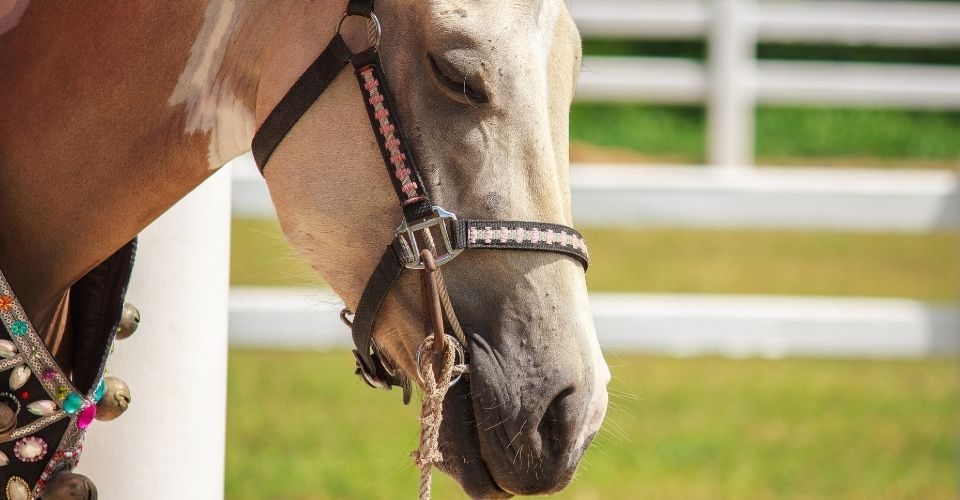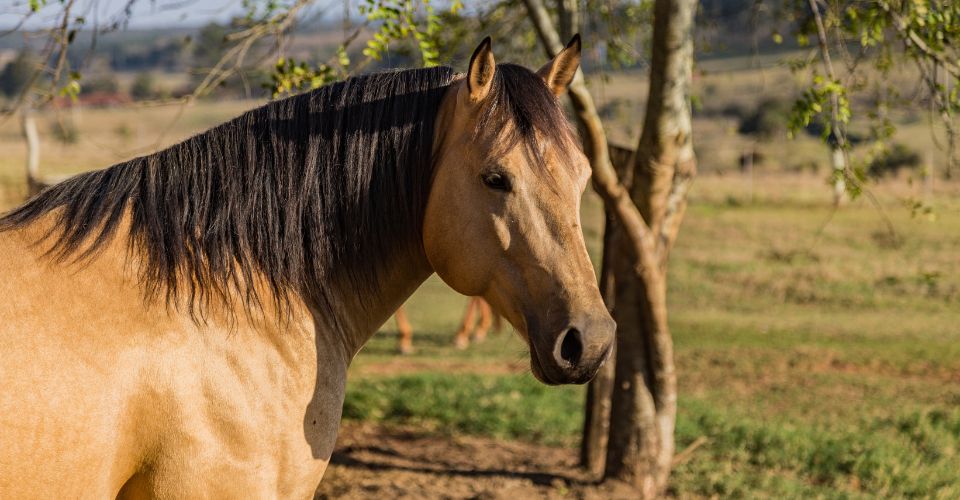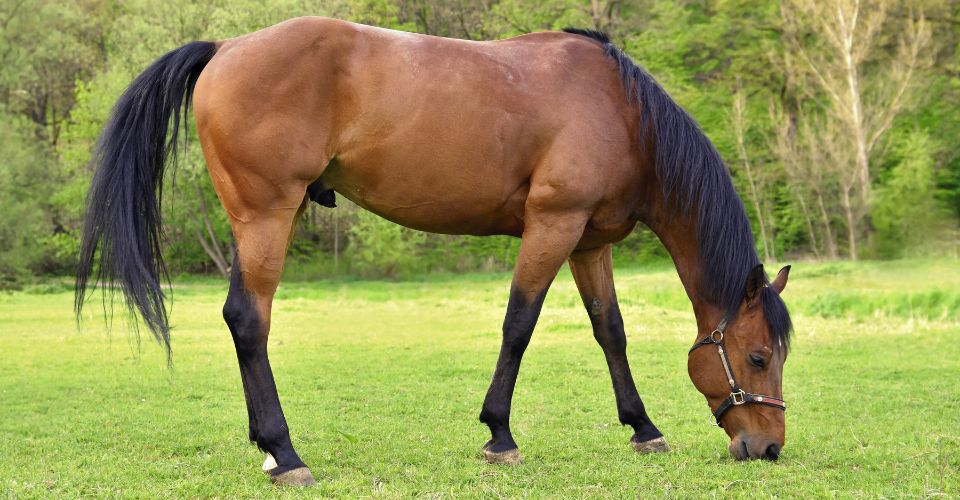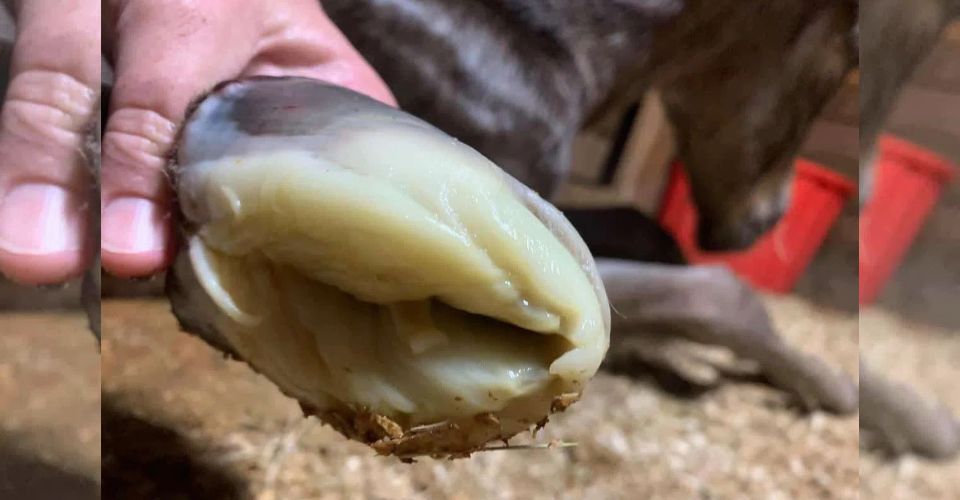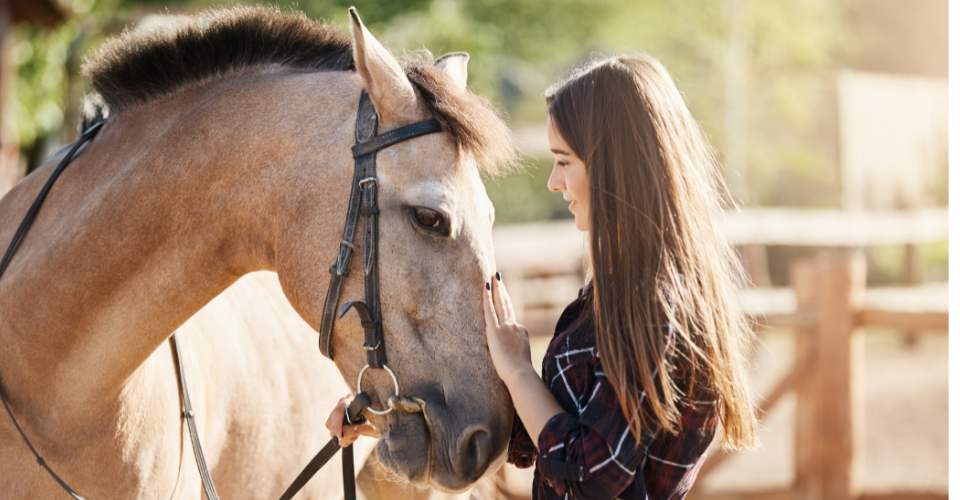Do horses sleep standing up? Well, most people who have been close to horses know that they can sleep standing up. Horses, in fact, doze, while on their feet and lie down for REM (Rapid Eye Movement) sleep.
But let’s be clear. This is not sleeping. They just snooze standing up, as Anna O’Brien, DVM, writes.
While snoozing, they are capable of locking up large joints in their limbs. This activity is known as “stay apparatus” and is usual among other huge land mammals, including elephants, cattle, and giraffes.
The mutual thing in these animals is that they are large and are hunted by predators. Essentially, they have evolved this way because sleeping while lying down can be a bit unsafe. It takes a little strength for horses to get up, which makes them susceptible to attacks by predators while they are asleep. They can run away more quickly if they are standing rather than lying. So, horses sleep standing up to defend themselves.
What is Stay Apparatus
The “stay apparatus” is an interplay between muscles, sinews, and ligaments that allows the horse to stay upright without any muscular exertion and allow the body to rest. While sleeping in an upright position, the horse may divide its weight between three limbs instead of four and rest one foot. The horse may then rest and sleep without fear of collapsing. One of a horse’s hind legs is generally relaxed.
Horses lie down only when they require deep sleep, generally in a series of brief intervals comprising two to three hours each day. Even so, they frequently have a second horse waiting close to act as a lookout—provided that there is a second horse nearby.
If you own a horse, you’ve probably noticed that these massive animals have peculiar sleeping patterns. Horses, unlike other pets, have distinct sleeping patterns that may perplex new owners, but there’s typically no need to be alarmed if you notice unusual horse napping.
In the wild, horses have a natural tendency to sleep since they must be continuously vigilant and guard themselves. This is generally the explanation for their odd sleeping patterns, thus knowing their background might help you comprehend them.
In this brief guide, we have covered the reasons why your horse may sleep standing up, as well as the amount of time your horse should sleep each day.
REM Sleep of Horses
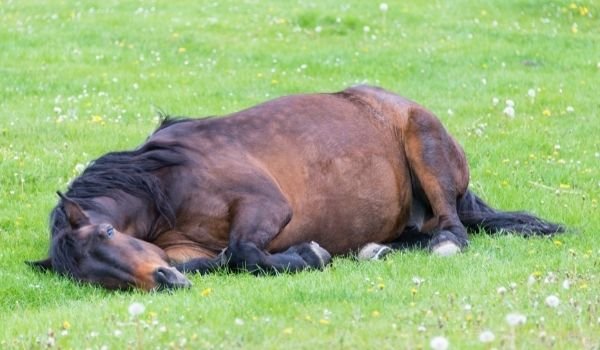
Horses, unlike humans and other domestic pets, require extremely little REM sleep on a daily basis. When horses lie down to slumber, this is the portion of the sleep cycle that we recognize as being in a “deep sleep.”
You may observe your horse moving his or her legs while resting on the side when in REM sleep. If this happens, it’s probably fair to believe your horse is having a dream!
Horses only have a few minutes of REM sleep throughout each sleep cycle. The other type of dozing is a light sleep, which is noticeable when your horse sleeps standing up, and their hind legs change position.
Since horses are large animals, lying down for lengthy periods of time might impede their blood flow. They only lie down during REM sleep since this puts too much strain on their internal organs. As a result, they sleep while standing up at different times during the day.
Why Do Horses Sleep Standing Up?
Horses do have a remarkable capacity to sleep standing up. But do horses ever sleep lying down?
Yes! Many horses, in fact, prefer to sleep lying down rather than standing up because it is more comfortable.
A herd of horses with many of them lying down but at least one standing up is not unusual. The standing horse keeps an eye on the others, keeping an eye out for any potential predators or other danger indicators.
When a horse sleeps while standing, it is not in a deep sleep but rather a lighter dozing. Horses, like humans, require REM sleep (rapid eye movement sleep), which occurs during deep sleep. Horses, like humans, also slumber in slow-wave sleep (also known as SWS). To do this, the horse must lie down on its side, not merely with its legs tucked beneath its body.
Why Should Horses Be Able to Sleep Standing Up?
Horses grew in the wide plains. As a prey species, they were required to be able to detect whether another animal that might kill them (a predator) was around.
Being able to relax or sleep standing up meant they could receive some rest while still being able to flee swiftly if they encountered a predator. One of the reasons horses run so rapidly is to get away from something. Earlier, the horses who ran the quickest had a greater chance of surviving.
Three Legs On, One Leg Off
The most fascinating aspect of horses resting while standing up is the manner in which they do it. In horses, there exists a unique arrangement of muscles and the components that link muscles and bones (ligaments and tendons). The stay apparatus is what it’s called.
Horses using the stay apparatus may stand on three legs while resting the other. They may switch which leg they rest on so that all of their legs receive a break. A horse’s legs need to rest because they can weigh more than 500kg!
Despite the fact that horses can sleep standing up, scientists believe horses need to lie down and sleep every day. The quality of sleep varies during the night. Everyone, including horses, goes through distinct periods of lighter and deeper sleep.
Horses that are lying down are only observed in the deeper phases of sleep. Both horses and humans require deeper phases of sleep in order for our brains to function correctly.
Horses’ Sleep Time
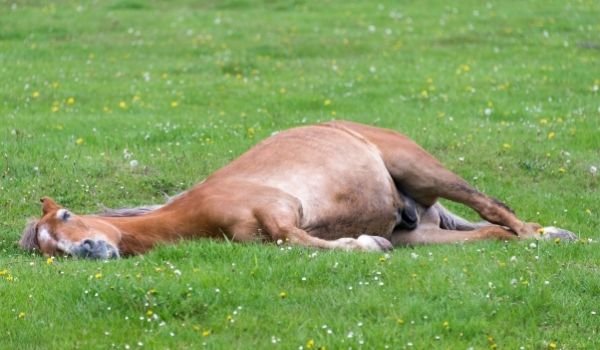
Unlike humans, who sleep for hours at a time, horses sleep in shifts throughout a twenty-four-hour period. Standing up, horses may sleep for a few minutes at a time or lie down for a few hours in REM sleep. The amount of time spent sleeping varies from a few hours to more than 12 hours each day. Younger horses, such as fillies and colts, sleep for longer periods of time than adult horses.
The sleeping schedule of a horse varies and is influenced by its surroundings. A horse maintained in a box stall, for example, may sleep more when there is less activity around the barn, such as at night. Two horses stabled close to one other may seem to have the same sleeping patterns, sleeping at the same time.
Horses resting down on their sides in a pasture, especially in the sun, are also not unusual. They are in perfect condition. They’re just savoring REM slumber in the comfort and warmth of the open air.
Horses require 30 minutes to three hours of REM sleep every day, although this is only a minor portion of their daily routine. In a 24-hour period, most horses require 5-7 hours of sleep.
Reasons and Side Effects of Insufficient Sleep in Horses
If a horse does not receive enough sleep, the negative consequences may not show up for a few days. But over time, the horse may become restless, angry, and even dangerous. A horse that hasn’t had enough sleep may fall in unexpected locations, such as at a show. This has been recorded in a number of instances.
Stress, loneliness, noise, loss of security from being in a new area, joint issues, insufficient room to lie down, and social insecurity induced by scenarios like a new horse being introduced to a herd or a new aggressive horse nearby are all reasons why a horse could not get enough sleep.
Sleep deprivation causes lethargy and severe fatigue in horses, which leads to poor performance and attitude.
Horses with REM sleep problems wake themselves up with excessive body movements, resulting in a lack of sleep.
Other sleep problems in horses include narcolepsy, which occurs when a fully awake horse falls asleep unexpectedly, and hypersomnia, which occurs when a horse sleeps excessively. Both of these issues might indicate neurological illness and should be checked out by a veterinarian.
Do Horses Snore?
Some horses, like some humans, have irritating sleeping habits. When it comes to snoring, some horses do snore a lot. If they do groan, moan, and snuffle while sleeping, there is nothing to worry about.
Some horses may not snore or may not be very often nor too loud. Maybe because of their sleeping habits, they rarely get into a deep sleep, especially if they are surrounded by people.
You may not have expected horses to snore, but you can expect anything from horses. After all, they’re surprising creatures.
Horses are neither nocturnal nor diurnal, they sleep whenever needed. During their short naps, they usually sleep while standing, whereas on their REM nap, they sleep while lying down.
Horses prefer frequent short periods of sleep during the day, not long stretches of eight hours like humans. Their sleep patterns change with age, though.
Do horses sleep standing up? To sum up, yes, they sleep standing up. It is due to the stay apparatus and has much to do with the way they have evolved. Nevertheless, they do require deep sleep for which they will have to lie down.

